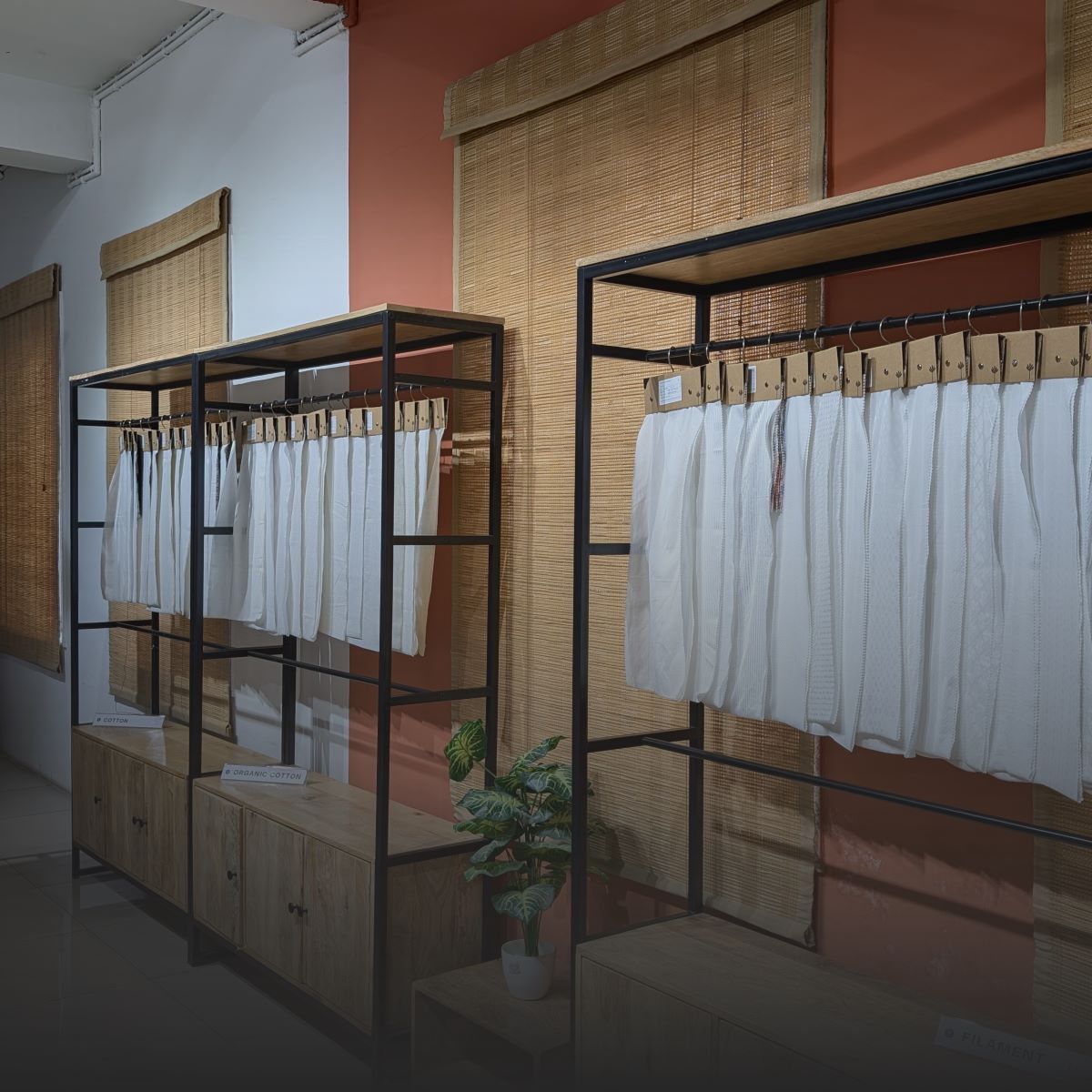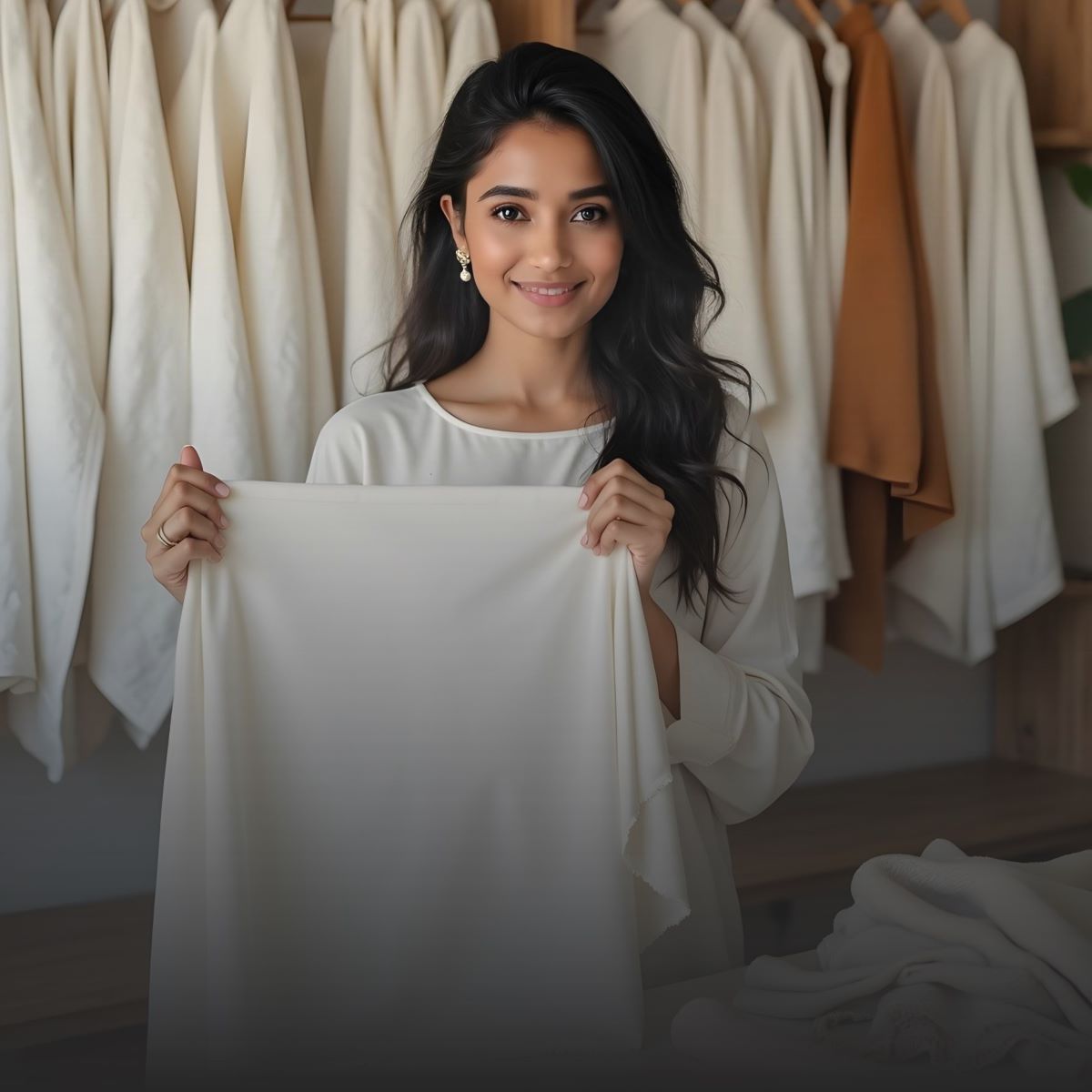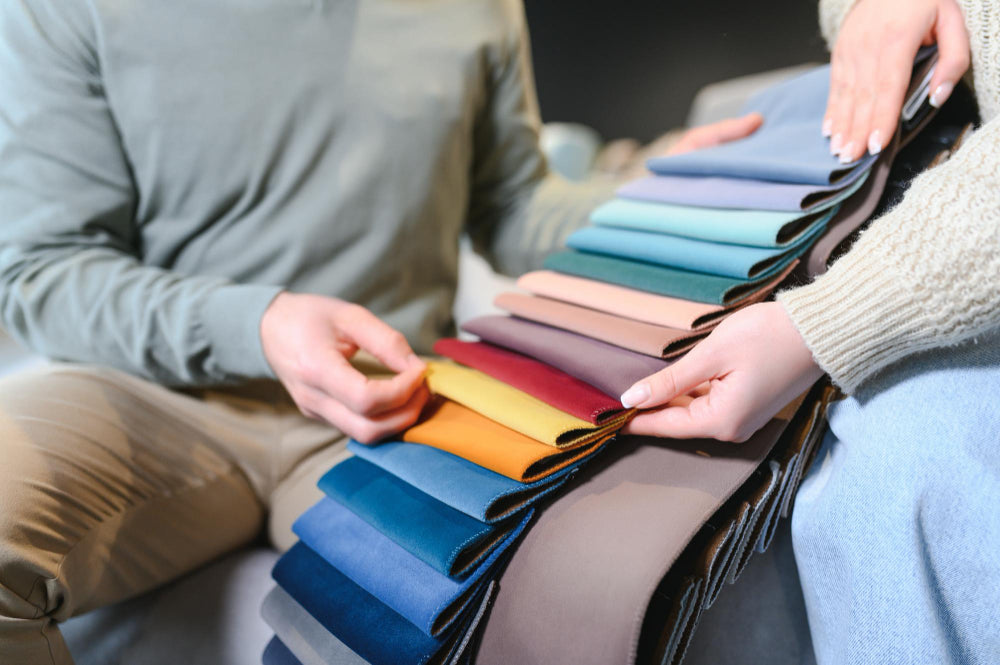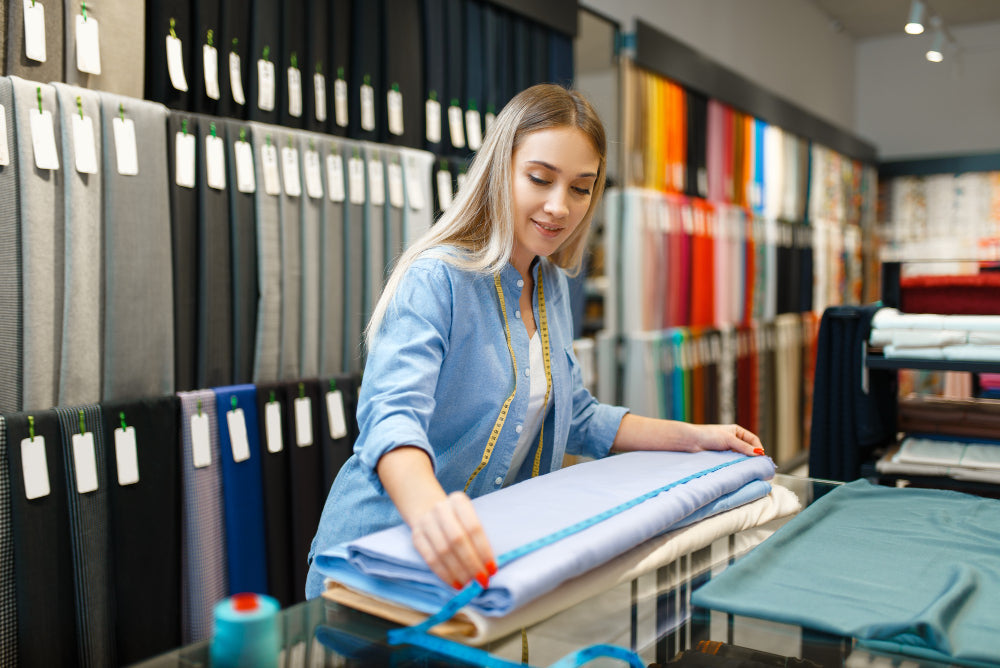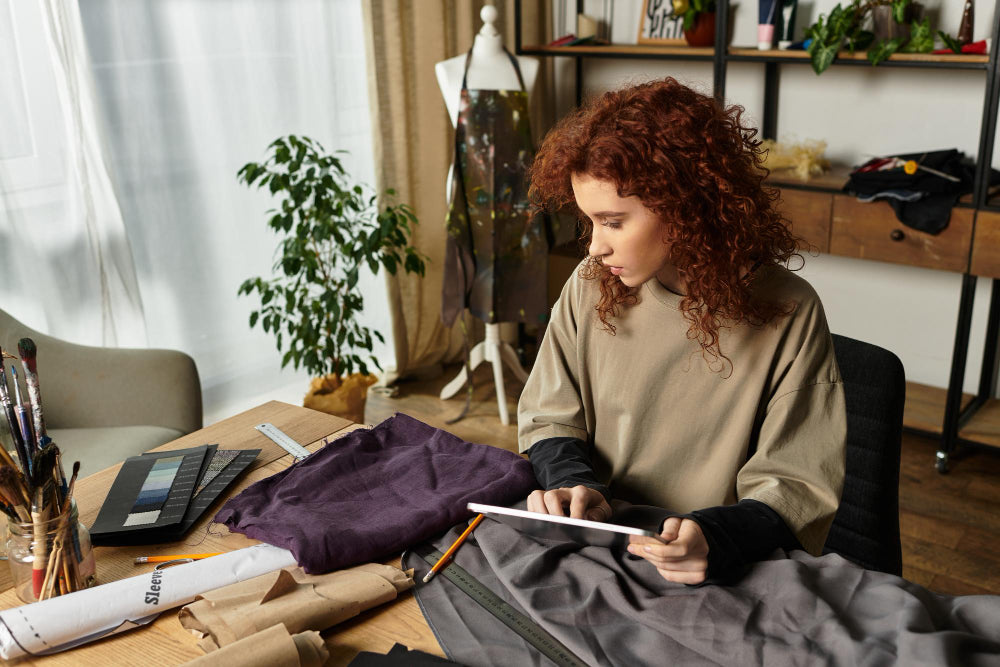Introduction
Building a fashion label takes more than creativity. Behind every silhouette and sketch lies one of the most significant decisions a designer will make: choosing the right fabric. From fit and drape to finish and feel, the fabric is the foundation of every garment.
For Canadian designers, sourcing fabric is not just a step in the process but a turning point. It determines quality, cost, sustainability and production speed. With the rising demand for ethical, low-waste fashion across Canada, designers are rethinking where, how and from whom they source their materials.
But here is the reality:
Access to high-quality, customizable fabrics in small quantities remains limited across most of Canada.
What this guide will help you solve
This blog was written to help Canadian fashion brands, boutique owners and independent designers understand:
- The fabric sourcing landscape in Canada
- Where to find sustainable and certified textile options
- How to choose suppliers that offer low MOQs and custom prints
- And which partners can actually support you from sampling to final delivery
Whether you are just starting out or scaling up, this guide will help you source smarter, reduce risks and align your sourcing with your brand values.
Click Here! If You Want More Related Information : Leading Fashion Influencers in Canada
Why Sourcing Fabric in Canada Is Challenging for Fashion Designers

Fabric sourcing in Canada is difficult due to limited local textile mills, high import duties, lack of small-batch support and minimal options for customization or sustainable fabrics.
In Canada, the fashion industry is growing, but fabric sourcing is not keeping up. Most designers face a common challenge: the supply does not match the evolving demand. The struggle is real whether you are a startup or an established label.
1. Limited Local Manufacturing Options
Canada has a small number of active textile mills and many cater to industrial or upholstery needs rather than fashion. As a result, designers looking for cotton poplin, silk blends, viscose or certified sustainable fabrics often have no local access to them.
2. High Costs of Imports
When designers look overseas, they often face high shipping charges, import duties and longer timelines. This increases the total cost of fabric per meter, directly impacting garment pricing and profitability.
3. No Support for Small Quantities
Most global suppliers expect high Minimum Order Quantities (MOQs), sometimes as high as 500 meters. For independent or emerging designers working on seasonal drops, that's neither affordable nor practical.
4. Customization Is Rare
Local suppliers rarely support custom printing, dyeing or fiber blends in small batches. Designers looking to create exclusive prints, sustainable color palettes or artisanal textures struggle to find responsive partners.
5. Lack of Flexibility Slows Down Design Timelines
Sampling, fabric testing or quick iterations become difficult when suppliers do not support fast turnaround or low-volume swatch deliveries.
What Canadian Fashion Designers Truly Need from Fabric Suppliers

Canadian fashion designers need low-MOQ options, access to sustainable and certified fabrics, diverse fabric types, customization services, fast sampling and reliable logistics to meet modern design and production demands.
Once you understand the gaps in Canadian fabric sourcing, the next question is: what exactly should a designer look for?
To stay competitive, fashion labels need partners who offer not just products but real flexibility and support at every step of the journey.
1. Small Minimum Order Quantities (MOQs)
Startups and boutique brands in Canada usually create capsule collections or test ideas seasonally. That’s why sourcing platforms must allow orders starting as low as 50–100 meters per fabric or print instead of enforcing industrial-level quantities.
2. A Wide Range of Fabric Types and Styles
Canadian designers are no longer sticking to basics. There is increasing demand for organic cotton, silk blends, Tencel™, Modal, Linen and innovative fabrics like Cupro or Bamboo.
A good supplier should offer both traditional weaves and modern blends in fashion-friendly textures and drapes.
3. Sustainable and Certified Options
More Canadian customers are prioritizing eco-conscious buying. Designers need access to fabrics that are:
-
GOTS-certified organic
-
OEKO-TEX tested for harmful chemicals
-
AZO-free dyed
- Biodegradable or responsibly processed
This is no longer a premium "nice-to-have" but a standard expectation.
4. Custom Printing and Dyeing Support
From exclusive prints to Pantone-matched solids, modern brands are defined by signature aesthetics. This is only possible when sourcing partners provide services like:
-
Digital printing
- Screen printing
-
Handcrafted printing (Ajrak, Dabu, Kalamkari)
- Custom dyeing on demand
5. Fast Sampling, Testing and Feedback
Designers work on tight calendars. Waiting weeks for swatches or lab dips delays everything from prototyping to launch.
A dependable fabric partner should offer:
-
Quick sample yardage
-
In-house quality testing
- Fabric feedback reports (shrinkage, GSM, fastness)
6. Global Logistics That Work for Canada
Logistics should be transparent and predictable. Designers need:
-
Doorstep delivery across Canadian provinces
-
Duties and taxes calculated upfront
-
Tracking systems
- Minimal communication gaps
Top Fabric Sourcing Options in Canada

Canada has a few local fabric suppliers, such as Fabricland, Textile Trimmings and Len's Mill Stores. While accessible, these options are often limited in variety, support and sustainability, prompting many designers to look for more scalable sourcing partners.
If you are a Canadian designer trying to source quality fabric locally, you have likely hit some walls, a lack of variety, limited yardage or no room for customization.
Here is a quick look at your homegrown options:
Fabricland
-
Location: Across Canada
-
What it offers: Affordable basics, home sewing supplies, printed cotton
-
Good for: DIYers, beginners, crafting projects
- Challenges for designers: No fabric certifications, limited high-end options, not ideal for bulk or fashion collections
Len’s Mill Stores
-
Location: Southern Ontario
-
What it offers: Large-scale retail stock, quilting and garment fabrics
-
Good for: Local buyers, smaller projects
- Challenges: Not fashion-industry focused, lacks sustainable options, limited bulk sourcing tools
Why Local Is not Always Enough
Most of these suppliers cater to consumer or hobbyist needs. If you are building a label, especially one rooted in sustainability, customization or premium aesthetics, you will quickly outgrow these resources.
That's where global sourcing comes into play.
Why Fabriclore is a Game-Changer for Canadian Designers

Fabriclore offers Canadian designers low MOQs, over 300+ fabric options, sustainable certifications and doorstep delivery, making it a powerful sourcing partner for scaling collections without compromising creativity or ethics.
Fabriclore is not just another fabric supplier. It's a strategic sourcing platform built to empower independent designers, growing brands and boutique labels, especially in regions like Canada where local sourcing falls short.
Here is how Fabriclore helps Canadian designers break sourcing barriers:
A Sustainable Foundation
- Organic Cotton, Bemberg Cupro, Greige, Lenzing Modal and more
-
Backed by: GOTS, OEKO-TEX, BCI certifications
- Designed for conscious collections that care for both people and the planet
300+ Fabric Varieties at Your Fingertips
- From classic cotton to artisanal silks, Schiffli, LIVA™ and modal blends
- Digital, handloom and printed selections
- Perfect for everything from resort wear to street-style
Low Minimums, Big Creative Freedom
- Order as little as 100 meters per print
- Choose from Digital, Screen or Hand Block Printing
- Explore Indian craft techniques like Ajrak, Kalamkari, Indigo and Dabu
Lab-Tested Quality, Every Time
- 20+ defect checks per fabric roll
- Shrinkage, GSM and colorfastness testing done in-house
- No surprises when you unbox your delivery
Built-in Support, Right to Your Door
-
Doorstep delivery across Canada
- 40% fewer follow-ups due to dedicated sourcing managers
- Assistance with swatches, sampling, dyeing and production logistics
In a market where choices are slim and imports get expensive, Fabriclore bridges the gap — combining India's rich textile heritage with tech-enabled sourcing for the modern Canadian designer.
How Canadian Designers Can Start Sourcing with Fabriclore

Getting started with Fabriclore is simple, fast and designed to match the pace of your brand.
Whether you are building a seasonal line or a small-batch capsule, you can explore hundreds of sustainable, customizable fabrics without delays or complexities.
Step 1: Explore the Catalog
Browse our digital catalog tailored for fashion brands and studios.
Here you will find:
- Over 300+ certified fabrics
- Sustainable blends like Organic Cotton, Lenzing Modal, Cupro and more
- Custom dyeable bases, handloom textures, digital-ready fabrics
Step 2: Order Samples with Ease
Before placing bulk orders, test the fabric yourself:
-
Order printed samples online in just a few clicks
- Request swatch to compare textures and colors
- Try sample yardage for drape tests or mockups
- Want your own design printed? Upload your artwork directly
- Choose from screen, digital or artisan prints like Ajrak, Kalamkari, Indigo and more
Step 3: Talk to a Fabric Expert
Not sure what suits your collection best?
Call or chat with our sourcing experts to:
- Finalize the right base fabric
- Discuss custom printing or dyeing
- Get help with lead times, testing and certifications
Call us at 08800554542 Or Chat with us online: fast, responsive and free
A Seamless Onboarding & Delivery Process
From sampling to doorstep delivery in Canada, our process is:
-
Quick to onboard: no paperwork maze
-
Transparent: clear lead times and fabric specs
-
Reliable: 40% fewer follow-ups with proactive updates
- Supportive: one point of contact for all your sourcing needs
Whether you are launching your first line or scaling up sustainably, Fabriclore is ready to partner with you at every stage.
Final Thoughts: Fabric Sourcing Made Simple for Canada

Sourcing fabric in Canada does not have to mean making compromises.
Canadian designers have had to choose between sustainability, growth or style for a long time. Now, it is possible to have all three.
Fabriclore connects traditional Indian craftsmanship with the needs of modern fashion brands. With small minimum order quantities, eco-certified fabrics, extensive customization options and dedicated support, we help Canadian brands create thoughtfully and efficiently.
Whether in Toronto working on a high-street label or in Vancouver starting a slow fashion studio, you now have a partner who understands what it takes to grow, design and stand out.
Click Here! If You Want More Related Information : The Best Ethical And Affordable Clothing Brands In Canada
FAQs
Where does Canada import textiles from?
Canada imports textiles mainly from countries like China, the United States, India, Bangladesh and Vietnam. These countries offer a wide range of fabrics, from basic cotton to specialty textiles. Due to limited local textile production, Canadian designers rely on these global suppliers to access diverse, affordable and high-quality fabrics.
Which location is best for the textile industry?
Globally, textile industries thrive in regions with strong manufacturing infrastructure and skilled labor. In North America, the United States and Mexico have significant textile hubs. For Canadian designers, partnering with suppliers in India and China offers access to extensive, diverse fabric catalogs and sustainable options. Within Canada, major cities like Toronto and Montreal provide access to fabric distributors and textile services, but large-scale production remains limited.
Is there any fabric made in Canada?
Yes, Canada produces some fabrics, primarily focused on technical textiles, wool and specialty fibers. However, the scale is small compared to imports. Canadian mills produce high-quality wool fabrics sourced from local sheep, supporting niche markets like outdoor wear and luxury garments. For most fashion designers, imported fabrics still make up the majority of sourcing needs.
Does Canada have a textile industry?
Canada has a textile industry, but it is smaller and more specialized than countries known for large-scale fabric manufacturing. The industry focuses on technical textiles, natural fibers like wool and some apparel fabric production. Many Canadian brands rely on international suppliers for mainstream fashion textiles due to limited local mills and fabric variety.
Looking for the best Wholesale Fabric Supplier in Canada? Click here to explore premium fabrics at unbeatable prices!
We also happen to be a magnet for suggestions, and would love to catch yours….throw us yours on hello@fabriclore.com
